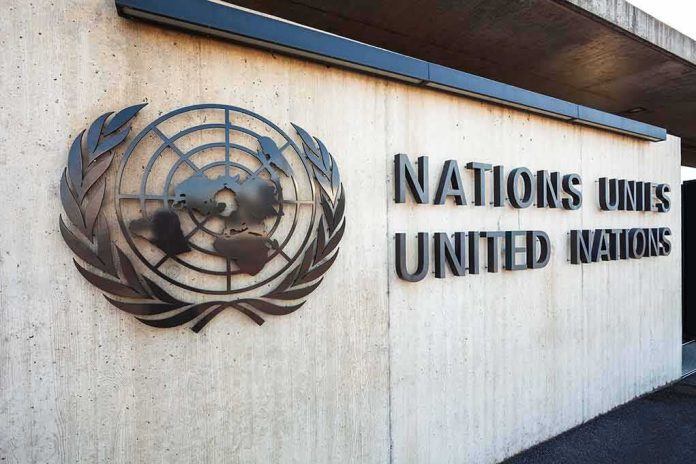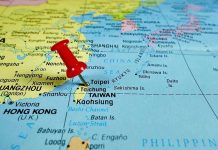
Three acts of sabotage, the president’s demand for answers, and the world’s most powerful diplomatic institution caught in the crossfire—what really happened at the United Nations, and who stands to gain or lose the most?
Story Snapshot
- Trump accuses unnamed actors of orchestrating a “triple sabotage” at the UN, targeting U.S. interests.
- Allegations emerge during a period of intense geopolitical tension and high-stakes diplomacy.
- No public evidence yet confirms sabotage, but investigations and security reviews are underway.
- The incident exposes vulnerabilities in international institutions and ignites debate over transparency and U.S. sovereignty.
Trump’s Triple Sabotage Accusation Shakes the UN
President Donald Trump’s forceful call for an investigation into what he described as “triple sabotage” at the United Nations landed like a thunderclap in the midst of the annual General Assembly. Trump took to Truth Social, alleging that three coordinated attacks—undermining U.S. diplomatic efforts, security protocols, and a pivotal international agreement—had occurred in rapid succession. He painted the incidents as deliberate attempts to weaken American influence, demanding Congress and the UN Security Council intervene.
Trump’s assertion arrived during a week already charged with diplomatic friction. The U.S. State Department acknowledged “unusual activity” at the UN but held back from confirming sabotage, while the UN Secretary-General pledged an internal review of security procedures. The escalation of Trump’s rhetoric, amplified by social media and cable news, turned a string of ambiguous incidents into a full-blown international controversy.
Security Breaches and Diplomatic Disruptions Under Scrutiny
The timeline of events began on September 20, when reports surfaced of security breaches and disruptions in diplomatic channels at UN headquarters. These incidents coincided with contentious debates over sanctions, climate policy, and peacekeeping mandates. The high concentration of global leaders in New York—a perennial target for adversaries—raised the stakes for both the U.S. and the broader international community.
Historical context reveals that the UN has always been a battleground for espionage, cyberattacks, and covert influence. Recent years have seen a marked uptick in cyber intrusions and diplomatic confrontations, notably between the U.S., China, and Russia. The “triple sabotage” claim, however, is unprecedented in scale and timing. Previous breaches, such as the 2018 expulsion of Russian diplomats and the 2020 UN server cyberattack, pale in comparison to the coordinated nature alleged by Trump.
Stakeholders, Power Struggles, and Unanswered Questions
Donald Trump, the U.S. State Department, UN leadership, and the UN Security Council. Trump’s motivations are clear: he seeks to cast himself as protector of U.S. sovereignty and transparency, perhaps with an eye toward political leverage. The State Department and UN officials, meanwhile, tread cautiously, balancing the need for security with the imperative to avoid panic or unfounded accusations.
Potential foreign actors remain unnamed, fueling speculation and suspicion. The UN must navigate competing interests among member states, especially as Trump’s call for investigation reverberates through Congress and international media. Official statements have thus far been measured, with both U.S. and UN spokespeople emphasizing their commitment to safety and due process.
If someone at the UN intentionally stopped the escalator as the President and First Lady were stepping on, they need to be fired and investigated immediately.
The Times reported this on Sunday.👇 pic.twitter.com/NitsWbGYG0
— Karoline Leavitt (@PressSec) September 23, 2025
Investigations, Impact, and the Battle for Public Perception
The UN Secretary-General announced an internal review, and congressional leaders were demanding classified briefings. Yet, no concrete evidence of sabotage has been presented to the public. Investigations remain at a preliminary stage, with heightened security at UN headquarters and a growing chorus of demands for transparency.
The immediate impact includes disruption of diplomatic activities and a spike in political debate within the U.S. In the long term, the incident may erode trust in UN security and accelerate calls for reform. The cost of enhanced security measures is likely to rise, while anxiety over international threats spreads among diplomats and the public. Politically, Trump’s intervention injects fuel into partisan disputes and strains U.S.-UN relations.
Expert Analysis: Security, Politics, and Procedural Rigor
Security analysts caution against jumping to conclusions, stressing the importance of a thorough investigation. Diplomatic experts note that sabotage claims, though rare, must be treated with utmost transparency and seriousness. Political scientists suggest Trump’s move is as much about political theater as legitimate concern, highlighting the intersection of security and strategy.
Academic voices urge procedural rigor and calm, warning that escalation without evidence could damage the credibility of both the UN and the U.S. The major media outlets and think tanks agree: the controversy underscores vulnerabilities in international institutions and the risks of politicizing security incidents. Until official findings emerge, stakeholders must balance vigilance with restraint.
Sources:
The New York Times, September 2025
Council on Foreign Relations, 2025







